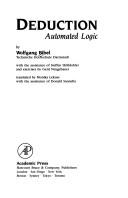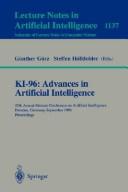| Listing 1 - 8 of 8 |
Sort by
|
Book
ISBN: 354051533X 038751533X 3540482261 9783540515333 9780387515335 Year: 1989 Volume: 353 Publisher: Berlin: Springer,
Abstract | Keywords | Export | Availability | Bookmark
 Loading...
Loading...Choose an application
- Reference Manager
- EndNote
- RefWorks (Direct export to RefWorks)
Equations play a vital role in many fields of mathematics, computer science, and artificial intelligence. Therefore, many proposals have been made to integrate equational, functional, and logic programming. This book presents the foundations of equational logic programming. After generalizing logic programming by augmenting programs with a conditional equational theory, the author defines a unifying framework for logic programming, equation solving, universal unification, and term rewriting. Within this framework many known results are developed. In particular, a presentation of the least model and the fixpoint semantics of equational logic programs is followed by a rigorous proof of the soundness and the strong completeness of various proof techniques: SLDE-resolution, where a universal unification procedure replaces the traditional unification algorithm; linear paramodulation and special forms of it such as rewriting and narrowing; complete sets of transformations for conditional equational theories; and lazy resolution combined with any complete set of inference rules for conditional equational theories.
Artificial intelligence. Robotics. Simulation. Graphics --- Logic programming --- 681.3*D32 --- 681.3*F41 --- 681.3*I23 --- language classifications: applicative languages; data-flow languages; design languages; extensible languages; macro and assembly languages; nonprocedural languages; specialized application and very high-level languages (Programminglanguages) --- Mathematical logic: computability theory; computational logic; lambda calculus; logic programming; mechanical theorem proving; model theory; proof theory;recursive function theory--See also {681.3*F11}; {681.3*I22}; {681.3*I23} --- Deduction and theorem proving: answer/reason extraction; reasoning; resolution; metatheory; mathematical induction; logic programming (Artificial intelligence) --- 681.3*I23 Deduction and theorem proving: answer/reason extraction; reasoning; resolution; metatheory; mathematical induction; logic programming (Artificial intelligence) --- 681.3*F41 Mathematical logic: computability theory; computational logic; lambda calculus; logic programming; mechanical theorem proving; model theory; proof theory;recursive function theory--See also {681.3*F11}; {681.3*I22}; {681.3*I23} --- 681.3*D32 language classifications: applicative languages; data-flow languages; design languages; extensible languages; macro and assembly languages; nonprocedural languages; specialized application and very high-level languages (Programminglanguages) --- Logic Programming --- Artificial intelligence. --- Computer science. --- Artificial Intelligence. --- Mathematical Logic and Formal Languages. --- Programming Languages, Compilers, Interpreters. --- Informatics --- Science --- AI (Artificial intelligence) --- Artificial thinking --- Electronic brains --- Intellectronics --- Intelligence, Artificial --- Intelligent machines --- Machine intelligence --- Thinking, Artificial --- Bionics --- Cognitive science --- Digital computer simulation --- Electronic data processing --- Logic machines --- Machine theory --- Self-organizing systems --- Simulation methods --- Fifth generation computers --- Neural computers

ISBN: 0792362616 9048154383 9401593833 Year: 2000 Publisher: Dordrecht ; Norwell, MA : Kluwer,
Abstract | Keywords | Export | Availability | Bookmark
 Loading...
Loading...Choose an application
- Reference Manager
- EndNote
- RefWorks (Direct export to RefWorks)
`Intellectics' seeks to understand the functions, structure and operation of the human intellect and to test artificial systems to see the extent to which they can substitute or complement such functions. The word itself was introduced in the early 1980s by Wolfgang Bibel to describe the united fields of artificial intelligence and cognitive science. The book collects papers by distinguished researchers, colleagues and former students of Bibel's, all of whom have worked together with him, and who present their work to him here to mark his 60th birthday. The papers discuss significant issues in intellectics and computational logic, ranging across automated deduction, logic programming, the logic-based approach to intellectics, cognitive robotics, knowledge representation and reasoning. Each paper contains new, previously unpublished, reviewed results. The collection is a state of the art account of the current capabilities and limitations of a computational-logic-based approach to intellectics. Readership: Researchers who are convinced that the intelligent behaviour of machines should be based on a rigid formal treatment of knowledge representation and reasoning.
Artificial intelligence. --- Cognitive science. --- Logic. --- Artificial Intelligence. --- AI (Artificial intelligence) --- Artificial thinking --- Electronic brains --- Intellectronics --- Intelligence, Artificial --- Intelligent machines --- Machine intelligence --- Thinking, Artificial --- Bionics --- Cognitive science --- Digital computer simulation --- Electronic data processing --- Logic machines --- Machine theory --- Self-organizing systems --- Simulation methods --- Fifth generation computers --- Neural computers --- Argumentation --- Deduction (Logic) --- Deductive logic --- Dialectic (Logic) --- Logic, Deductive --- Intellect --- Philosophy --- Psychology --- Science --- Reasoning --- Thought and thinking --- Methodology
Book
ISBN: 3319244884 3319244892 Year: 2015 Publisher: Cham : Springer International Publishing : Imprint: Springer,
Abstract | Keywords | Export | Availability | Bookmark
 Loading...
Loading...Choose an application
- Reference Manager
- EndNote
- RefWorks (Direct export to RefWorks)
This book constitutes the refereed proceedings of the 38th Annual German Conference on Artificial Intelligence, KI 2015, held in Dresden, Germany, in September 2015. The 15 revised full technical papers presented together with 14 technical communications, 4 doctoral consortium contributions, and 3 keynotes were carefully reviewed and selected from 58 submissions. The conference provides the opportunity to present a wider range of results and ideas that are of interest to the KI audience, including reports about recent own publications, position papers, and previews of ongoing work.
Computer Science --- Mechanical Engineering - General --- Engineering & Applied Sciences --- Mechanical Engineering --- Computer science. --- Mathematical logic. --- Information storage and retrieval. --- User interfaces (Computer systems). --- Artificial intelligence. --- Computer simulation. --- Computer Science. --- Artificial Intelligence (incl. Robotics). --- Information Storage and Retrieval. --- Simulation and Modeling. --- User Interfaces and Human Computer Interaction. --- Mathematical Logic and Formal Languages. --- Information Systems Applications (incl. Internet). --- Computer modeling --- Computer models --- Modeling, Computer --- Models, Computer --- Simulation, Computer --- Electromechanical analogies --- Mathematical models --- Simulation methods --- Model-integrated computing --- AI (Artificial intelligence) --- Artificial thinking --- Electronic brains --- Intellectronics --- Intelligence, Artificial --- Intelligent machines --- Machine intelligence --- Thinking, Artificial --- Bionics --- Cognitive science --- Digital computer simulation --- Electronic data processing --- Logic machines --- Machine theory --- Self-organizing systems --- Fifth generation computers --- Neural computers --- Interfaces, User (Computer systems) --- Human-machine systems --- Human-computer interaction --- Algebra of logic --- Logic, Universal --- Mathematical logic --- Symbolic and mathematical logic --- Symbolic logic --- Mathematics --- Algebra, Abstract --- Metamathematics --- Set theory --- Syllogism --- Informatics --- Science --- Artificial intelligence
Book
ISBN: 3540878033 3540878025 Year: 2008 Publisher: Berlin, Germany : Springer,
Abstract | Keywords | Export | Availability | Bookmark
 Loading...
Loading...Choose an application
- Reference Manager
- EndNote
- RefWorks (Direct export to RefWorks)
This book constitutes the refereed proceedings of the 11th European Conference on Logics in Artificial Intelligence, JELIA 2008, held in Dresden, Germany, Liverpool, in September/October 2008. The 32 revised full papers presented together with 2 invited talks were carefully reviewed and selected from 98 submissions. The papers cover a broad range of topics including belief revision, description logics, non-monotonic reasoning, multi-agent systems, probabilistic logic, and temporal logic.
Artificial intelligence --- Logic, Symbolic and mathematical --- Information Technology --- Artificial Intelligence --- Artificial intelligence. --- Computer science. --- Artificial Intelligence. --- Programming Languages, Compilers, Interpreters. --- Programming Techniques. --- Mathematical Logic and Formal Languages. --- Informatics --- Science --- AI (Artificial intelligence) --- Artificial thinking --- Electronic brains --- Intellectronics --- Intelligence, Artificial --- Intelligent machines --- Machine intelligence --- Thinking, Artificial --- Bionics --- Cognitive science --- Digital computer simulation --- Electronic data processing --- Logic machines --- Machine theory --- Self-organizing systems --- Simulation methods --- Fifth generation computers --- Neural computers --- Programming languages (Electronic computers). --- Computer programming. --- Mathematical logic. --- Algebra of logic --- Logic, Universal --- Mathematical logic --- Symbolic and mathematical logic --- Symbolic logic --- Mathematics --- Algebra, Abstract --- Metamathematics --- Set theory --- Syllogism --- Computers --- Electronic computer programming --- Electronic digital computers --- Programming (Electronic computers) --- Coding theory --- Computer languages --- Computer program languages --- Computer programming languages --- Machine language --- Languages, Artificial --- Programming
Book
ISBN: 9783540878032 Year: 2008 Publisher: Berlin Heidelberg Springer Berlin Heidelberg
Abstract | Keywords | Export | Availability | Bookmark
 Loading...
Loading...Choose an application
- Reference Manager
- EndNote
- RefWorks (Direct export to RefWorks)
This book constitutes the refereed proceedings of the 11th European Conference on Logics in Artificial Intelligence, JELIA 2008, held in Dresden, Germany, Liverpool, in September/October 2008. The 32 revised full papers presented together with 2 invited talks were carefully reviewed and selected from 98 submissions. The papers cover a broad range of topics including belief revision, description logics, non-monotonic reasoning, multi-agent systems, probabilistic logic, and temporal logic.
Mathematical logic --- Programming --- Artificial intelligence. Robotics. Simulation. Graphics --- programmeren (informatica) --- wiskunde --- logica --- robots

ISBN: 9780120958351 012095835X Year: 1993 Publisher: London: Academic press,
Abstract | Keywords | Export | Availability | Bookmark
 Loading...
Loading...Choose an application
- Reference Manager
- EndNote
- RefWorks (Direct export to RefWorks)
high-order --- Deduction --- Logic --- Inference --- Automatic theorem proving. --- Logic, Symbolic and mathematical.

ISBN: 3540617086 3540706690 9783540617082 Year: 1996 Volume: 1137 Publisher: Berlin: Springer,
Abstract | Keywords | Export | Availability | Bookmark
 Loading...
Loading...Choose an application
- Reference Manager
- EndNote
- RefWorks (Direct export to RefWorks)
This book constitutes the refereed proceedings of the 20th Annual German Conference on Artificial Intelligence, KI-96, held in Dresden, Germany, in September 1996. The book presents three invited papers together with 23 revised full research papers, nine posters and four systems demonstrations. All contributions were carefully selected from a larger number of excellent submissions, of which a considerable part had been submitted from abroad. The papers address many subareas of AI; however, there is a certain focus on new develpments in theorem proving, knowledge representation, and reasoning.
Artificial intelligence --- Automatic theorem proving --- Knowledge representation (Information theory) --- Reasoning --- Congresses. --- Congresses --- Artificial intelligence. --- Artificial Intelligence. --- AI (Artificial intelligence) --- Artificial thinking --- Electronic brains --- Intellectronics --- Intelligence, Artificial --- Intelligent machines --- Machine intelligence --- Thinking, Artificial --- Bionics --- Cognitive science --- Digital computer simulation --- Electronic data processing --- Logic machines --- Machine theory --- Self-organizing systems --- Simulation methods --- Fifth generation computers --- Neural computers --- Artificial intelligence - Congresses. --- Automatic theorem proving - Congresses. --- Knowledge representation (Information theory) - Congresses --- Reasoning - Congresses.
Multi
ISBN: 9783540878032 Year: 2008 Publisher: Berlin, Heidelberg Springer-Verlag Berlin Heidelberg
Abstract | Keywords | Export | Availability | Bookmark
 Loading...
Loading...Choose an application
- Reference Manager
- EndNote
- RefWorks (Direct export to RefWorks)
This book constitutes the refereed proceedings of the 11th European Conference on Logics in Artificial Intelligence, JELIA 2008, held in Dresden, Germany, Liverpool, in September/October 2008. The 32 revised full papers presented together with 2 invited talks were carefully reviewed and selected from 98 submissions. The papers cover a broad range of topics including belief revision, description logics, non-monotonic reasoning, multi-agent systems, probabilistic logic, and temporal logic.
Mathematical logic --- Programming --- Artificial intelligence. Robotics. Simulation. Graphics --- programmeren (informatica) --- wiskunde --- logica --- robots
| Listing 1 - 8 of 8 |
Sort by
|

 Search
Search Feedback
Feedback About UniCat
About UniCat  Help
Help News
News